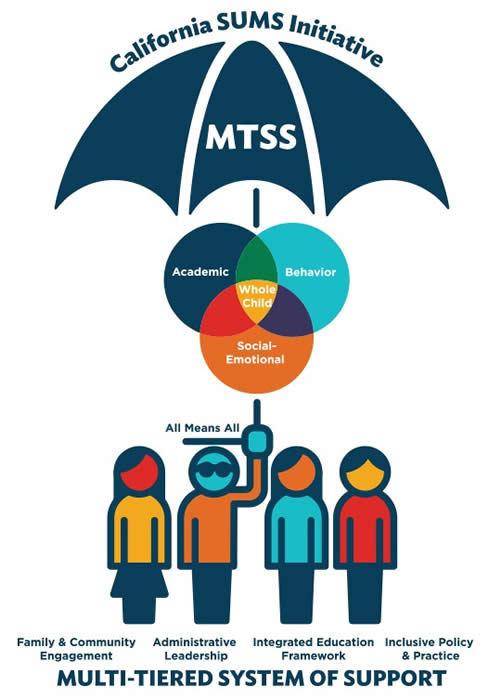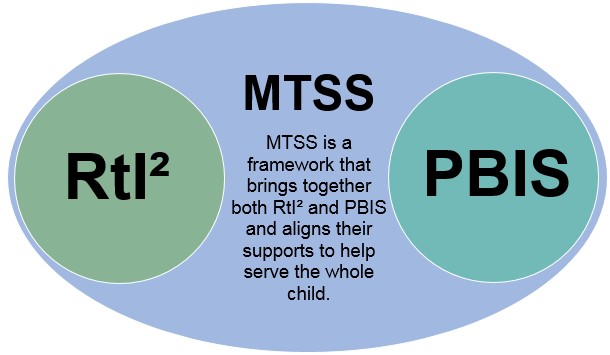Multi-Tiered System of Supports
A framework that aligns Response to Instruction and Intervention with the California State standards and the systems necessary to ensure academic, behavior, and social success.What is a Multi-Tiered System of Support (MTSS)?
California’s MTSS focuses on aligning initiatives and resources within an educational organization to address the needs of all students. It is an integrated, comprehensive framework for local educational agencies (LEA) that aligns academic, behavioral, and social-emotional learning in a fully integrated system of support for the benefit of all students. MTSS offers the potential to create systematic change through intentional integration of services and supports to quickly identify and meet the needs of all students.
California’s vast and complex Prekindergarten through grade twelve educational system requires a multifaceted approach that is scalable and sustainable. The California Department of Education’s (CDE) vision of “one coherent system of education” offers an opportunity to build the foundation for educational excellence. Through the use of Implementation Science, Universal Design for Learning, and the Whole Child approach, among other evidence-based interventions, MTSS affords a full range of academic, behavioral, and social support for all students to achieve.
View a quick primer video on MTSS
![]() (Video, 3:27), created by the Orange County Department of Education (OCDE), for an overview of MTSS.
(Video, 3:27), created by the Orange County Department of Education (OCDE), for an overview of MTSS.
Statewide Initiative
The focus of the Scaling Up MTSS Statewide (SUMS) Initiative is to develop resources for MTSS within an LEA that align the academic, behavioral, and social-emotional supports in an LEA in order to serve the whole child. It involves family and community engagement, administrative leadership, integrated education frameworks, and inclusive policy and practice.

Background
In 2015, Assembly Bill 104, Chapter 13, Statutes of 2015, appropriated $10,000,000 for developing, aligning, and improving systems of academic and behavioral supports (ISABS). The CDE conducted a competitive grant process and awarded the funds to the OCDE for their SUMS proposal, which included the Butte County Office of Education (Butte COE) as a rural partner. In 2016, an additional $20,000,000, appropriated by Senate Bill 828, Chapter 29, Statutes 2016, augmented the original grant award. The Budget Act of 2018 authorized an additional $15,000,000, appropriated by AB 1808, Chapter 32, Statues of 2018 and SB 840, Chapter 29, Statutes of 2018. This phase of the grant focuses on improving school climate statewide.
The purpose of the full $95,000,000 awarded to date is to encourage LEAs to establish and align schoolwide, data-driven systems of academic and behavioral supports to more effectively meet the needs of California’s diverse learners in the most inclusive environment. The SUMS initiative enables the OCDE and its partners to develop and disseminate statewide resources and technical assistance for this purpose. Finally, the Budget Act of 2021 appropriated an additional $50,000,000 to the SUMS initiative. The legislation required the OCDE to award $30,000,000 of these funds as subgrants to LEAs. The legislation also required the CDE to conduct a process to select a partner entity to work with the OCDE and the Butte COE to support high quality professional learning for educators.
Additional information about the application process for each phase of the grant funding is available below:- Request for Applications 2015–16
- Errata Used to Update Applications
- Funding Results for 2015–16
- Funding Results 2016–17
- Funding Results 2018–19
- Funding Results 2021–22
OCDE MTSS SUMS Funding
For the first two funding phases of the SUMS grant, the OCDE subcontracted with the Schoolwide Integrated Framework for Transformation (SWIFT)
![]() Technical Assistance Center at the University of Kansas and the Butte COE to partner with the SUMS effort. The Butte COE shares SUMS professional learning resources through an online platform, and engages rural areas of the state to support their unique needs. SWIFT is a technical assistance center that builds school capacity to support all students both academically and behaviorally. The SWIFT staff supports the SUMS grant by providing technical assistance and professional learning opportunities to participating LEAs.
Technical Assistance Center at the University of Kansas and the Butte COE to partner with the SUMS effort. The Butte COE shares SUMS professional learning resources through an online platform, and engages rural areas of the state to support their unique needs. SWIFT is a technical assistance center that builds school capacity to support all students both academically and behaviorally. The SWIFT staff supports the SUMS grant by providing technical assistance and professional learning opportunities to participating LEAs.
During the first two funding phases, the OCDE provided subgrants to LEAs to engage them in a process to assess their strengths, coordinate supports to their Local Control and Accountability Plans (LCAP) and align their MTSS efforts with the eight state priorities. The OCDE distributed the grant funding into three separate cohorts with up to $6,000,000 awarded in each round of applications.
For the third funding phase, the OCDE and the Butte COE partnered with the University of California, Los Angeles (UCLA) Center for the Transformation of Schools
![]() to expand the state's MTSS framework. Through this collaborative effort, they developed evidence-based tools and training for educators and school systems. Their work expands restorative justice, bullying prevention and positive behavior interventions and minimize the use of emergency interventions. Their joint effort also established a pilot program to help LEAs to promote positive school climates by improving student-teacher relationships, increasing student engagement, and promoting alternative discipline practices.
to expand the state's MTSS framework. Through this collaborative effort, they developed evidence-based tools and training for educators and school systems. Their work expands restorative justice, bullying prevention and positive behavior interventions and minimize the use of emergency interventions. Their joint effort also established a pilot program to help LEAs to promote positive school climates by improving student-teacher relationships, increasing student engagement, and promoting alternative discipline practices.
The Budget Act of 2021 appropriated $50,000,000 to the OCDE for the SUMS project. The OCDE awarded $30,000,000 as subgrants to LEAs. Additionally, $12,500,000 was awarded to the CDE and selected Placer County Office of Education as the partner entity to expand the state’s capacity to support LEAs’ implementation of social-emotional learning, trauma-informed practices, and culturally relevant, affirming, and sustaining practices. To learn more about the SUMS Partner Entity Request for Applications, visit the CDE’s SUMS Partner Entity Request for Application web page.
Visit the OCDE’s MTSS SUMS web page
![]() for more information
about SUMS.
for more information
about SUMS.
ISABS/SUMS Legislative Reports
ISABS Grant Annual Reports are required pursuant to AB 104 (Chapter 13, Statutes of 2015) and amended by SB 828 (Chapter 29, Statutes of 2016), beginning in the 2015–16 fiscal year and continuing until all grants funds are expended. Included in these reports are: an overview of the ISABS grant reporting requirements; a summary of the ISABS annual reports; and a copy of the annual reports, in their original form as submitted to the State Superintendent of Public Instruction by the OCDE. The ISABS Grant Annual Reports provide details regarding how the OCDE used the grant funds. The OCDE’s fiscal reporting for each year includes an expenditure narrative, a budget narrative, and a budget detail report. The ISABS Annual Reports also include a description of how OCDE met the legislative requirements of the grant. These reports are available through the following links:
- 2015–16 ISABS Grant Annual Report
- 2016–17 ISABS Grant Annual Report
- 2017–18 ISABS Grant Annual Report
- 2018–19 ISABS Grant Annual Report
- 2019–20 ISABS Grant Annual Report
- 2020–21 ISABS Grant Annual Report
- 2021–22 ISABS Grant Annual Report
- 2022–23 ISABS Grant Annual Report
Contact Information
OCDE Leadership Team ![]()
Contact information for the state and regional leaders for the MTSS SUMS grant.
For additional information on the SUMS grant, contact Alison Pettit by e-mail at apettit@cde.ca.gov.
Training and Resources
Training
OCDE’s Online Training Series
![]()
The OCDE has developed an online training series to help LEAs in building an MTSS framework. The training series can be found on the OCDE’s web page
![]() .
.
Resources
These national and state web resources were selected on the basis of usefulness to beginning as well as advanced MTSS implementers in kindergarten through grade twelve contexts.
California MTSS Framework
![]()
An instructional handout that includes the Domains and Features of an MTSS Framework.
Local Control Accountability Plan (LCAP) and MTSS Alignment
![]()
An information handout on aligning the LCAP and MTSS and includes an LCAP/MTSS Crosswalk.
Guide to Understanding California MTSS
![]()
This guide provides an overview of MTSS in California
![]() (PDF).
(PDF).
Continuum of Support
![]()
This brief provides information about universal, supplemental, and intensified support within an MTSS framework.
MTSS Professional Learning Institute (PLI)
![]()
Information regarding the annual MTSS PLI.
System of Engagement
![]()
The California MTSS framework uses a whole system of engagement to effectively link school, district, county, regional, state, and federal resources in efficient and innovative ways.
MTSS and Special Education![]() (PDF)
(PDF)
This resource assists with understanding the intersection between
MTSS and special education and also defines the need for special educators to be involved in the MTSS planning process.
Connecting the Dots: Universal Design for Learning & CA MTSS
![]()
How Universal Design for Learning and MTSS framework align
PBIS & RTI
MTSS, Response to Instruction and Intervention (RtI²), and Positive Behavioral Interventions and Supports (PBIS) are often spoken of synonymously, and for those new to MTSS, it can be difficult to determine what people mean when these terms are used interchangeably. It is important to keep in mind, though, that MTSS is a framework for aligning resources and initiatives; it is a method of organization. As such, MTSS encompasses both RtI² and PBIS, and systematically addresses support for all students.

Since MTSS is a framework that brings together both RtI² and PBIS and aligns their supports to serve the whole child, it also relies on data gathering through universal screening, data-driven decision making, and problem solving teams, and focuses on content standards. MTSS aligns the entire system of initiatives, supports, and resources, and implements continuous improvement processes throughout the system.
RtI² is an approach that focuses on individual students who are struggling academically and pulls together resources from the LEA, school, and community to promote students’ success before they fall behind. It is systematic and data-driven with tiered levels of intervention to benefit every student.
PBIS
![]() is an approach that focuses on the emotional and behavioral learning of students, which leads to an increase in engagement and a decrease in problematic behavior over time. It assists the LEA in adopting and organizing evidence-based behavioral interventions that improve social and emotional behavior outcomes for all students.
is an approach that focuses on the emotional and behavioral learning of students, which leads to an increase in engagement and a decrease in problematic behavior over time. It assists the LEA in adopting and organizing evidence-based behavioral interventions that improve social and emotional behavior outcomes for all students.
